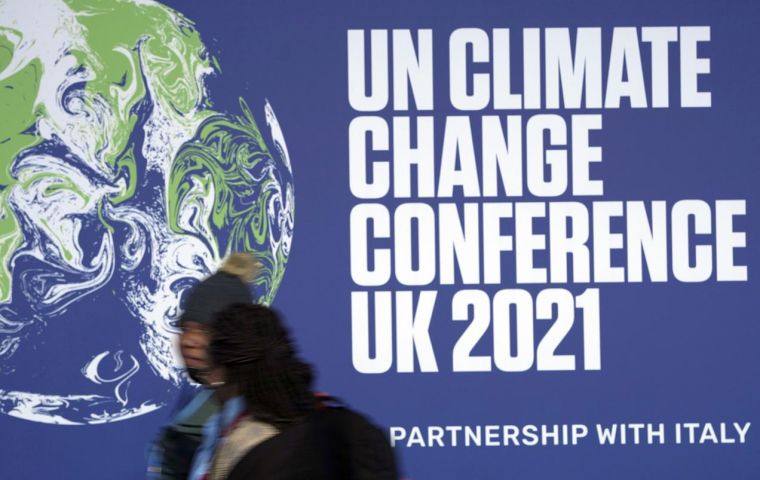MercoPress. South Atlantic News Agency
Glasgow's Climate Summit needs another day to agree on closing statement
 “The text is still not complete despite extensive discussions,” said Alok Sharma
“The text is still not complete despite extensive discussions,” said Alok Sharma Glasgow's COP26 Climate Summit Friday extended its closure as no consensus could be reached on the event's final day, it was reported.
The latest draft of a closing statement had difficulties finding its way through the 197 participating countries and territories and an extension was agreed upon until Saturday for talks to continue, while street protesters blamed governments for their “climate ineffectiveness.”
“I appreciate the advances in financing” reached at this summit, “but the text is still not complete despite extensive discussions,” said COP26 President, British Environment Minister Alok Sharma on Friday.
The draft for an agreement published on Friday generated controversy, in particular because of the change made to a paragraph on hydrocarbons. An earlier draft, released Wednesday, called on countries to “accelerate the end of coal and fossil fuel subsidies,” while the new one only called for “accelerating the phase-out of coal without carbon capture systems” and instead of calling for the elimination of fossil fuel subsidies, it merely mentioned “inefficient subsidies.” These small changes allow countries to maintain subsidies.
“Every year we struggle to find money [for other purposes], but 2.5 trillion in the last five or six years were to fossil fuel subsidies. That is the definition of insanity,” US envoy John Kerry stressed Friday during the climate summit where there are more delegates associated with the fossil fuel industry than from any single country.
Greenpeace, Oxfam and Friends of the Earth International have questioned the limitations that in their opinion were imposed by oil-producing countries and those dependent on this type of energy.
Greenpeace director Jennifer Morgan said the issue on hydrocarbons “has weakened critically,” though she noted that at least it was still there. The explicit mention of fossil fuels was not present in other UN summits in draft resolutions. Morgan also considered that this draft gives greater recognition to the financial needs of developing countries to adapt to the reduction of emissions, which was one of the issues under discussion Friday.
According to the draft penned by the United Kingdom, the richest countries needed to comply “urgently and completely” with their commitment to reach the 2015 Paris Agreement goals.
The draft also asked governments to “review and reinforce” their emission mitigation targets for 2030, with a view to the next summit, COP27, in 2022. As for those who have not yet presented targets, calls to establish them, and reaffirms the objective of achieving carbon neutrality in 2050. The document does not set targets in actions or dates, and although it says that the UN will review compliance with the objectives that are established, it does not have mechanisms to demand it. That is why environmental activists point out that much of what results from this agreement will depend on the will of rich countries.
On Thursday the network of environmental organizations CAN called for an end to the taboo on “the eradication of fossil fuel”, which is still maintained in negotiations such as the one underway in Glasgow and in statements such as the one that should emerge from the summit.




Top Comments
Disclaimer & comment rulesCommenting for this story is now closed.
If you have a Facebook account, become a fan and comment on our Facebook Page!